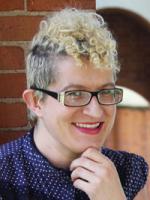Feminist theology, queer theology, the “dead white Germans” of European classic theology—Linn Tonstad lectures on them all. And they all contribute to her vital personal theological focus: the endeavor to examine and dispute modes of power that devalue people and the Christian gospel.
 Assistant professor of theology at YDS since 2012, Tonstad has grappled with the dynamics of power, dissent, and Christian conscience since childhood. She grew up as a Seventh-day Adventist in Norway, giving her early exposure to the heroes of Protestantism’s Radical Reformation wing.
Assistant professor of theology at YDS since 2012, Tonstad has grappled with the dynamics of power, dissent, and Christian conscience since childhood. She grew up as a Seventh-day Adventist in Norway, giving her early exposure to the heroes of Protestantism’s Radical Reformation wing.
“One of the Adventist themes I’ve always taken with me is: We’re told that it’s our own responsibility to figure out the truth. It’s not for the leaders of the church to say. It’s something we must do,” she says.
“Being an Adventist also gave me a sense of identifying with the Radical Reformation and its ancestors. They gave me a commitment to fighting for religious liberty. It’s all about contestation over power.”
As an Adventist she also observed the Sabbath—no small matter. She soon discovered that keeping Sabbath was a practice and a statement that went fiercely against the grain of commercial culture and secular assumptions. It helped her forge a posture of dissent from conventional patterns of thought.
“It gave me a sense of the possibilities of belief—and their costs. It takes a lot of work to oppose the culture daily at its core.”
Tonstad was born in California but moved with her family to Norway while she was still an infant. Her parents—her father is Norwegian, her mother Iraqi—met in medical school in California and married there. Growing up in a household of physician parents, Tonstad naturally gravitated to pre-med when she arrived at college, La Sierra University, a Seventh-day Adventist school in Riverside, CA. However, the pre-med plan disappeared the minute she discovered feminism, systematic theology, and philosophy.
For graduate school, her intellectual adventure continued at Yale Divinity School ’03 M.A.R and Yale University ’09 Ph.D. She joined the YDS faculty after teaching a year at Perkins School of Theology at SMU in Dallas. From 2009-11, she was a Lilly Fellow in the humanities and theology at Valparaiso University.
Tonstad says she has three areas of focus in theology. Feminism is her first love, including the power and freedom of feminist thought to challenge traditional trinitarian models. A second is European theology after Schleiermacher, its analytic rigor, its ambitious inquiry into the nature of God. A third is queer theology, which as proliferated as a theological discipline in the last two decades.
As Tonstad applies it, queer theology isn’t a celebration of sexuality but a way of facing the radical nature of the Christian gospel and unmasking the tyranny of exclusion—the brutal game of “who’s in, who’s out” in contemporary society. Queer theology is a method of investigating and questioning the sorts of demands that the social order makes on all people, she says – society’s whimsical definitions of normal and abnormal, culture’s decrees about who is acceptably human and who isn’t.
In a sermon at Marquand Chapel last fall, Tonstad used various New Testament passages to question the customary religious discussion about inclusion and exclusion, insiders and outsiders. Christian outreach to the outsider isn’t enough, she said. Even that generous ideal draws too stark a line between “us” and “them.”
In Matthew 25, for instance, Jesus famously says redemption depends on how believers treat the least of these. Christians may not realize how comprehensive this teaching is, she suggests. If Jesus is the true outsider, the “other,” and if we want to identity with Jesus, then all believers should see themselves as outsiders, “outside the gates” with Jesus—and make solidarity with all other outsiders, even ask forgiveness of other outsiders. The outsider-insider boundary breaks down.
“The implication of the story that Jesus tells is not merely that when his followers fail to comfort the afflicted, they fail at their Christian duty, although such is certainly the case,” she said in the September 2012 sermon. “Jesus’ story goes further to say that when nominal Christians refuse succor to those who suffer, we shut the church gates on Jesus: we ensure that the church is kept pure by shutting Jesus out … ”
Tonstad’s expansive theological interests tie back to a cherished Adventist theme: each person’s responsibility to investigate the truth. This principle informs her teaching philosophy. She aims to present students with a diversity of feminist, womanist, queer and classical theological positions rather than any one official version of any of these theologies.
In a recent post for Feminism and Religion, an online forum for contemporary scholars hosted by Claremont School of Theology, Tonstad wrote: “I want to give students the resources to develop their own constructive theological positions rather than encouraging them to share the positions to which I have come, and it is extremely important for students to recognize that there is no such thing as ‘the’ feminist position on most issues. But I also teach non-feminist, and even anti-feminist, theologians—pope-now-emeritus Benedict XVI being one such. I want students to see the power of the theological logics of his positions on issues where I think he comes to deeply mistaken conclusions—gender, sexuality, and authority being only a few of them. But I don’t teach him as an antagonist or a target. I want students to learn what his positions are so that they can evaluate them for themselves and not simply accede to my assessment; that too is a feminist principle of teaching, in my view.”
| Attachment | Size |
|---|---|
| 3.8 KB |